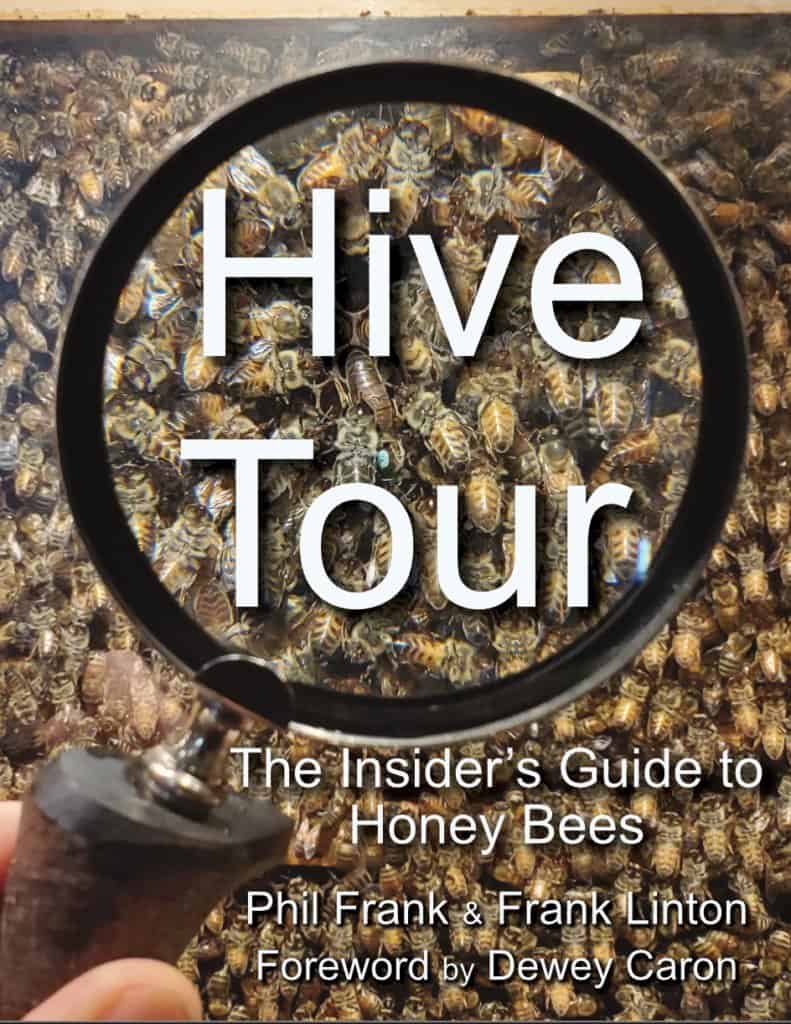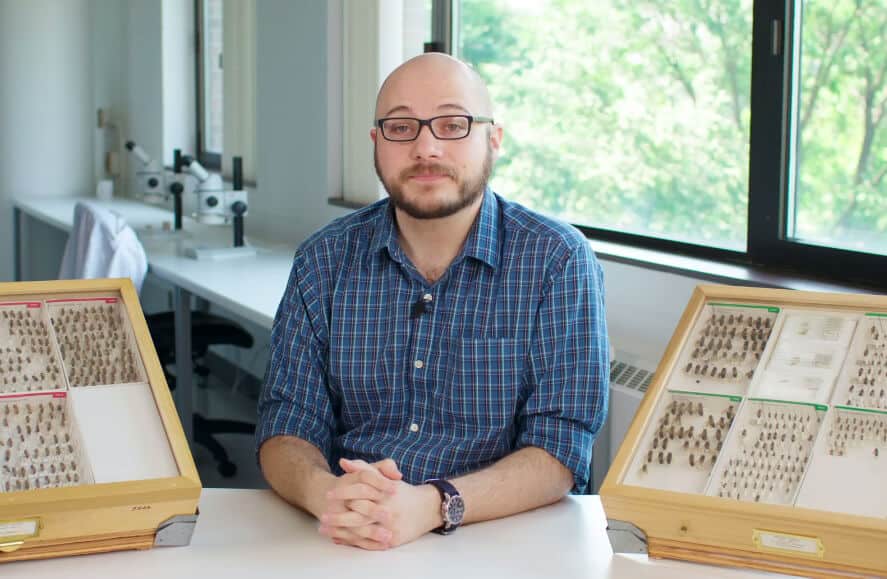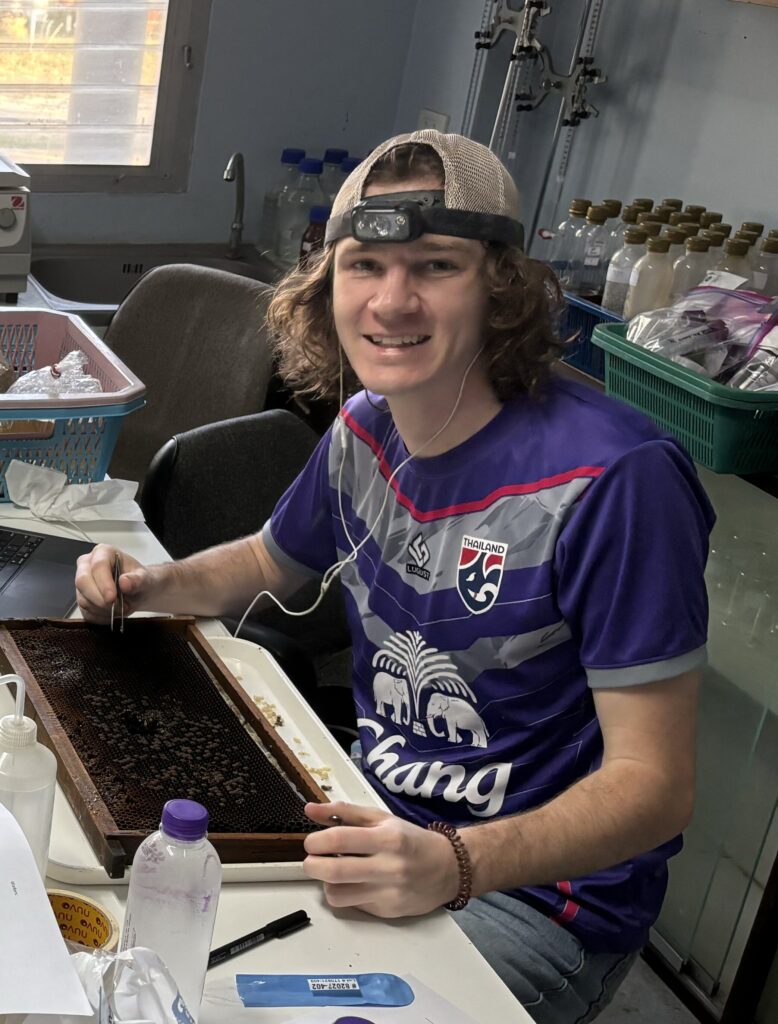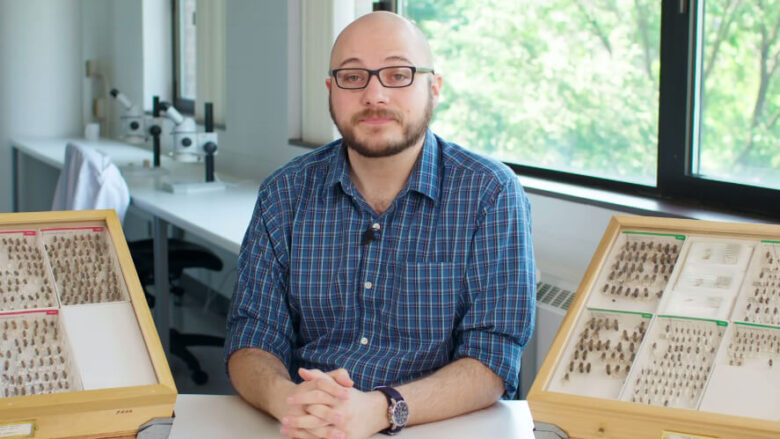DAY: Saturday, June 8, 2024
TIME: 8:30 am - 4:00 pm
WHERE: BOTH In-Person and via ZOOM. (HYBRID)
In-Person Location: University of Maryland, College Park, Plant Sciences Building, Room PLS 1140. Parking garage across the street is open and FREE!
LEARN - TONS!
SPEAKERS - David Peck, Rogan Tokach, Cybil Preston, & MORE
Note: BOTH Speakers will be present in-person!
You are not logged in. Please login TO VIEW THE RECORDING. Thanks!
DOOR PRIZE!
A copy of "Hive Tour:
The Insider's Guide to Honey Bees"
will be awarded in the morning!

TOPICS
The Infamous Tropilaelaps mites by Rogan Tokach
Understanding the biology, monitoring, and management of the mite garnering increased attention.
Tropilaelaps mercedesae is a parasitic mite on western honey bees causing increased concern as it continues its global expansion being discovered in new geographic areas. This talk goes into detail about the mite’s biology and life cycle, how it causes harm to honey bee colonies, and addresses current monitoring efforts being undertaken here in the US to determine rapid detection. The talk finishes up describing the different management practices that can be utilized to assist in control of this parasitic mite threat.
Beekeeping in Thailand vs the US Rogan Tokach
Come hear about how beekeeping in Thailand differs from in the United States. This talk focuses on Thai mite management, dealing with wasps feeding on colonies, and also covers the interesting dynamics of working with different honey bee species.
The Changing Legal Status of Oxalic Acid (Including Extended-release OA Pads for Varroa Control) by David Peck, PhD
We'll discuss the current labeling for oxalic acid as a honey bee miticide, and explore new research on dosage and administration methods expand the use of OA in beekeeping at both commercial scales and smaller scales. Some discussion of the EPA's labelling laws, and how they affect beekeepers, will be included, as well as a discussion of new and upcoming products that use oxalic acid to fight varroa mites.
Understanding Honey Bee Nutrition by Studying Digestion by David Peck, PhD
What should my bees be eating? What shouldn't they eat? How does the honey bee digestive tract process and absorb nutrients from what the bees consume? What are the dietary needs of different bees at different times in their lives? What stressors, like pesticides or pathogens, can affect our bees' digestion? By exploring how a honey bee's body absorbs what it eats, perhaps we can gain insights into what nutritional aids our bees may want or need from us.
SPEAKER BIOs
David Peck, PhD
Dr. Peck is the Director of Research and Education at Betterbee in Greenwich, NY, where he assists in product development and research, and also teaches classes and develops scientifically-sound educational materials. His doctoral work in Cornell University's Department of Neurobiology and Behavior was supervised by Professor Tom Seeley. His dissertation research focused on the transmission of mites between bee colonies, as well as the mite-resistance traits of the untreated honey bees living in Cornell's Arnot Forest.
After earning his degree, he has continued to research varroa/bee interactions, including fieldwork in Newfoundland, Canada (where varroa still have not arrived) and Anosy Madagascar (where varroa arrived only in 2010 or 2011). He has served as a teaching postdoctoral fellow in Cornell's Department of Entomology, and is still affiliated with Cornell through the Honey Bee Health program in the College of Veterinary Medicine. Dr. Peck has kept bees for more than a decade, though his home apiary is often full of mite-riddled research colonies so he doesn't usually produce much honey.


Rogan Tokach
Rogan Tokach is a PhD student at Auburn University under Dr. Geoff Williams. His research focuses on developing sustainable parasitic mite management strategies for beekeepers. His work in Auburn involves finding alternative treatment options for amitraz resistant Varroa mites. He has also had the opportunity to travel to Thailand to conduct research dedicated to filling knowledge gaps concerning Tropilaelaps mite management and dispersal. Rogan completed his master’s degree at University of Nebraska-Lincoln under Dr. Autumn Smart and Dr. Judy Wu-Smart where he studied the impacts a pesticide contaminated environment had on honey bee colony functions. Rogan has 14 years of beekeeping experience as a hobbyist, and researcher.
REGISTRATION is OPEN for the 2024 EAS Conference. This is a Not-To-Be-Missed event. It hasn't been in Maryland for 20 years. Check out this video to see what is in store!
EAS CONFERENCE IS COMING TO MD! AUG 5-9
ZOOM DETAILS
Join Zoom Meeting
https://us06web.zoom.us/j/3634766759?pwd=Vm9SSWFnS0ZKRWlKdWc0YnVrQi83Zz09&omn=84614802043
Meeting ID: 363 476 6759
Passcode: 119523
---
One tap mobile
+13017158592,,3634766759#,,,,*119523# US (Washington DC)
+13092053325,,3634766759#,,,,*119523# US
Meeting ID: 363 476 6759
Passcode: 119523
Find your local number: https://us06web.zoom.us/u/kdEiSulivW

